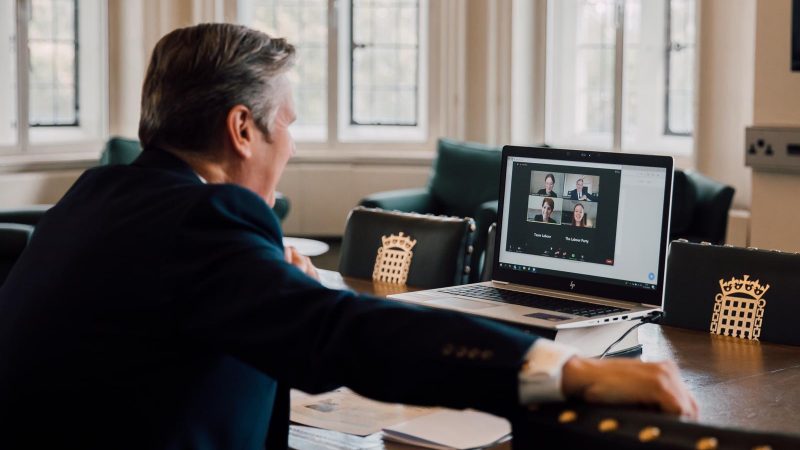
Keir Starmer has defended the Labour Party’s positions on Scottish independence and the controversial ‘spycops’ bill in the latest ‘Call Keir’ that took place this afternoon with Glasgow voters.
As the UK Labour leader spoke to Scottish voters, he was asked how his party intends to win back voters who have now switch to the SNP. Starmer replied: “The last thing I want is more barriers, more borders.”
Making the case against Scottish independence, Starmer said that a key principle should be “don’t pull people apart but pull together” – but added that “just backing the status quo isn’t going to work”.
Questioned by a young SNP member called Luke who described independence as “the way forward”, Starmer said he did “acknowledge the strength of feeling” over the issue but disagreed with the voter.
“There’s a very real sense of people saying I want control over what happens in my community,” Starmer told the Zoom attendees, saying that “some of that drove the European Union referendum” in 2016.
“I’ve seen examples in Scotland and elsewhere where people have had more control over the buildings they live in, the estate they live on, et cetera. It’s a very powerful thing. So I want to have that discussion.”
He explained: “I would advocate not the status quo in relation to arrangements with Scotland but a proper discussion about how do you put power and influence closer to Scotland… I don’t think tearing up the UK is the way to achieve that.”
Asked by the SNP supporter about recent polls showing strong support for independence among Scottish voters, Starmer replied that “there’s no point me pretending that doesn’t broadly reflect where a lot of people are in Scotland”.
But he added that “there is a question about where people’s priorities are”, referring to research conducted during the coronavirus pandemic that shows a fresh independence referendum is not a priority for Scottish voters.
Another Zoom contributor raised concerns about Labour MPs being whipped to abstain on the covert human intelligence sources (criminal conduct) bill earlier this month, which led to seven frontbench resignations.
Asked “why is Labour not taking a hard stance against what is essentially allowing police and undercover agencies to violate people’s human rights”, Starmer defended the whipping arrangement.
He said: “As you may know, I have been a human rights advocate all my life. I’ve written textbooks on it, done cases across the world, massively developed the case law under the Human Rights Act. There is no more passionate advocate of human rights… than myself.”
The Labour leader added that he had worked with security and intelligence services, and that in the last three years 27 terrorist plots had been brought down by undercover agents. “I know that first-hand,” he said.
“The argument that somehow we don’t need these powers is wrong,” Starmer argued, before adding that under the legislation “nothing can be authorised if it conflicts with or breaches the Human Rights Act”.
Starmer continued: “If you can’t authorise something that breaks the Human Rights Act, how on earth do people make the argument that you can break human rights under this bill?”
He added: “Under the Human Rights Act, torture is completely prohibited, murder is prohibited, rape is prohibited. This argument that you could sign off torture, murder and rape is just wrong. It is not possible to do it.
“Various government and others have tried to argue for many years that ‘surely torture under some circumstances is justified’, and the courts everywhere in the world have always said ‘no’.”
Critics of the ‘CHIS’ bill have argued that it goes further than putting current guidance on a “statutory footing” and instead creates advance immunity from prosecution for agents who may even have incited criminal activity.
Others, such as Labour MP Sarah Owen who stepped down from her frontbench post to oppose the bill, have raised concerns over the Human Rights Act defence as Tories are known to support repealing or “updating” the Act.
Put to him that the SNP has taken a hard line against the so-called ‘spycops’ bill, Starmer said: “All the bill does is taking existing and put them on the face of legislation… Opposing this bill means, do you get rid of the powers? No.
“You just put them in the shadows where there are no safeguards and no tribunal you can go to and no permission. All my life I’ve believed if the state should have power, it should be on the face of legislation.”
Starmer earlier this year launched a series of virtual public meetings, ‘Call Keir’, in which a journalist host facilitates questions from voters in particular constituencies or areas of the country for the leader to answer.




More from LabourList
Sadiq Khan signals he will stand for a fourth term as London Mayor
Starmer or Sarwar: Scottish Labour MSPs and MPs split over Keir Starmer’s future
‘Every Lidl helps: What can the Government do to bring down food prices?’